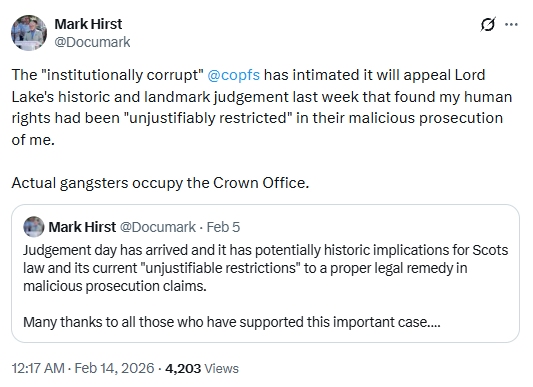PAUSE ON GRA NOW SAYS ALBA.
ALBA ADVISES ROBISON “PAUSE DIVISIVE GRA CHANGES BEFORE IT IS TOO LATE” In response to Shona Robinson’s statement on the Scottish Government draft GRA Bill, Equalities Convener of the ALBA Party, Eva COmrie, said; “The ALBA Party asks for a pause to the Gender Recognition Act reforms until the views of women’s groups and theContinue reading "PAUSE ON GRA NOW SAYS ALBA."
ALBA ADVISES ROBISON “PAUSE DIVISIVE GRA CHANGES BEFORE IT IS TOO LATE”
In response to Shona Robinson’s statement on the Scottish Government draft GRA Bill, Equalities Convener of the ALBA Party, Eva COmrie, said;
“The ALBA Party asks for a pause to the Gender Recognition Act reforms until the views of women’s groups and the EHRC are fully taken into account.
ALBA’s main issue with the Bill is the removal of a medical gatekeeping which will allow any male to identify as a female on his own say-so. This will open up women’s services and spaces to a whole new category of men.
ALBA believe that the Government’s GRA reforms are ill thought out, will not improve the life chances of Trans people and comprise a risk to the rights and safety of women, which single sex exemptions were designed to protect.
For the above reasons and without significant changes to the bill, ALBA will continue to wholeheartedly oppose these reforms.
ALBA requests that the Scottish Government pause GRA reform legislation until the views of women’s groups and the EHRC are fully taken into account, and the legality of the reforms, given the recent For Women Scotland court ruling on the separating of sex and gender reassignment, be assessed.”
Explanation
The Government describes this process as a simple administrative change, whilst also making bold disputed claims that it is life saving, urgent and absolutely essential.
The Scottish Government claims that the Bill has wide support; when questioned on the principle of improving the experiences of trans people the majority of the population agrees. No decent citizen could challenge the overhaul of a process described as degrading and intrusive.
Reform to alleviate negative experiences of a minority group is a laudable aim, but the stance adopted by legislators in this case, risks the sacrifice of the same or single sex protected rights of women.
The specific reforms invite controversy, for they comprise the removal of the need for medical certification of a diagnosis of gender dysphoria, and two years of living in the assumed gender, to be replaced with a simple affirmation by way of self identification and a three month period of reflection. In other words the change of gender, or as the legislation describes this, the change of sex marker on a birth certificate, becomes a simple process open to all, devoid of gatekeeping and for now with limitless unknown unmeasured impact.
Once the true impact and intent of this Bill are made clear, it alarms and is opposed by an overwhelming majority of the population, including women with lived experience of trauma, life long feminists, faith groups, parents, voluntary organisations and professionals who fear its manipulation by bad faith actors. The First Minister of Scotland has stated on record that these views are not valid.
The espoused concept that being a woman is a feeling or performance to be opted in and out of is comical to some and downright offensive to others. Multiple well founded concerns have already been raised about the impact of self ID on the rights of women and the potential for abusive men to exploit such an ill-considered and easily manipulated process. Numerous incidents of trans identifying males housed with female prisoners in Scottish prisons, with no consultation with women’s groups, and the resultant injury and distress to prisoners so affected, bear testament to the ad hoc, careless disregard the Scottish Government has for women’s rights which they seem content to surrender to male feelings.
Enabling any man to identify as a woman risks removing and ridiculing the purpose of dignity, privacy and safety of women’s changing rooms, hospital wards, and refuges. Enabling men to identify as women will impact on attempts to address historical structural inequality including the gender pay gap, the lack of female representation on boards, and in many sectors of employment such as STEM.
Human rights are inalienable but responsible legislators reinforce those in precious laws which state our values – as the Equality Act 2010 provides – but where those rights compete or conflict, those same lawmakers are enjoined in a democratic and respectful society to navigate these complexities openly and honestly. In this regard, by every possible measurement the Scottish Government has failed miserably. They have failed to consult openly, refused to publish two sets of consultation responses openly or comprehensively, negotiated with the proponents of the reforms, but only with great reluctance did they agree to listen to those who voiced concerns or opposition. This is not the means by which feminists protect the rights of women, and in the secrecy and apparent stealth of their attempted reforms there are signs that the Government may have materially worsened the experience of Trans people in Scottish society.
When Scotland was amongst world leading nations in introducing same sex marriage, despite the warnings of political consequences, the Government of the day listened to all points of view, treating everyone’s opinion on the matter as valid, and most importantly, by ensuring respect at the heart of the process. This approach enabled the nation to embrace legislation that had at times been opposed by many and attracted controversy.
Sadly, the Scottish Government has now succumbed to bullying politics of shouting slogans and shutting down debate while smearing those with a different world view or the temerity to question the prevailing ideology; that closed mindset does our country’s reputation no favour, stifles democratic debate and risks, rather than advances, equality.
It will now be for members of the Scottish Parliament to scrutinise this legislation.”
What's Your Reaction?










































